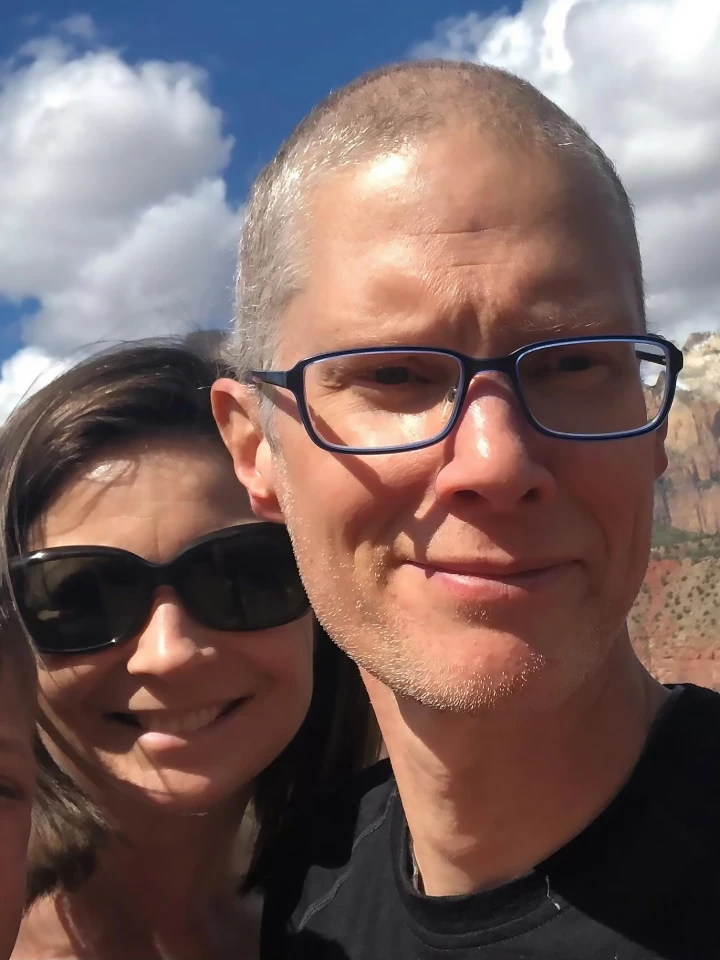Being diagnosed with potentially fatal metastatic breast cancer inspired one man to gather a team of diverse professionals to create an AI-based tool that analyzes a patient’s symptoms using a smartphone, providing oncologists with a means of providing an individualized treatment care plan to patients with metastatic cancer.
When Christopher Gregg was diagnosed with stage 4 metastatic breast cancer in 2018, he started thinking of ways of improving his – and others’ – cancer treatments. A neurobiology and human genetics professor at the University of Utah (the U) and member of the University’s Huntsman Cancer Institute at the U, Gregg assembled a 20-strong team to create a tool to help oncologists decide the right treatment path for patients with metastatic cancer.
“On the first day, we decided to make a tool that would help oncologists determine the right medication dose and treatment for each individual patient, giving them both the best chance at eliminating the cancer and the best quality of life,” Gregg said. “One of the biggest challenges for cancer treatment is that the drugs are toxic, so not only do we need to factor in the disease response but also how much of the medication their body can handle for a specific amount of time.”
Although breast cancer rates are higher for women, the American Cancer Society (ACS) estimates that, by the end of 2023, about 2,800 men in the US will have been diagnosed with invasive breast cancer and around 530 will die from it. When cancer is first discovered, doctors ‘stage’ it from zero to 4. Stage 4 cancer, which is what Gregg was diagnosed with, means the cancer has spread to distant parts of the body. The goal of treatment for metastatic cancer is often to slow or stop its spread. Treatment can include hormone therapy, chemo, targeted therapy and immunotherapy, as well as surgery.
Using the data from his own cancer treatment, Gregg and his team created a prototype AI algorithm that captures information about patient symptoms via a smartphone. Accurately measuring over 20,000 ‘micro-symptoms’ in behavior, speech, and vocal patterns ranging from abnormal neurological phenotypes and eye movements to sadness in the vocal tone, the AI assesses how patients are faring during their treatment and predicts changes to future symptoms. Oncologists can use these predictions to adjust a patient’s treatment, avoiding drug toxicity and dangerous side effects. In effect, the AI-based tool provides a tailored treatment plan for each patient and is designed to assist with any cancer treatment, not just treatment for breast cancer.

Gregg and the team’s tool won first prize at this year’s 11th annual Moffitt Cancer Center Integrated Mathematical Oncology (IMO) workshop, where mathematicians, researchers and clinicians from around the world gather to find innovative solutions for cancer treatment and care.
“My team at the Moffitt Cancer Center competition included 20 diverse experts from around the world,” Gregg said. “Expert mathematicians, researchers, software developers, and clinicians worked together to create a solution for metastatic cancer care. The amazing this about this workshop is that it creates an environment that fosters collaboration between those who may not usually work together.”
As competition winners, the team received a US$50,000 grant, which they’ll use to continue to develop the tool. A clinical trial of the tool is scheduled to start in January 2024 at the Moffitt Cancer Center.
But Gregg didn’t stop at developing a groundbreaking tool to aid metastatic cancer care and treatment.
“When I was diagnosed, I asked my oncologist at Huntsman Cancer Institute if there were any exciting new treatments that could be curative,” Gregg said. “She said after a long career in oncology, she’s seen many ideas and new medicines that didn’t turn out to be curative. She thought the solution would come from learning how to use the medications we already have in a better way. I started to shift my attention that way.”

Typically, if a patient with cancer responds positively to treatment, it’s given regularly. However, over time, cancer cells evolve to become treatment-resistant, necessitating the introduction of a new treatment. In so-called extinction therapy, additional therapeutic agents are introduced in relatively quick succession. The goal is to cure the patient while never using a drug long enough to permit the evolution of resistance. Extinction therapy formed the basis of Gregg’s first cancer treatment plan and has worked to effectively keep treatment resistance in check since his 2018 diagnosis.
“I’m doing really well right now,” said Gregg. “I’ve continued to innovate and come up with ideas to control the disease. I’ve been off treatment for many months at a time and successfully been able to keep the disease stable. My goal is turning metastatic cancer, which is currently a lethal disease, into a manageable chronic disease that offers patients a high quality of life for a long time.”
Source: Huntsman Cancer Institute







